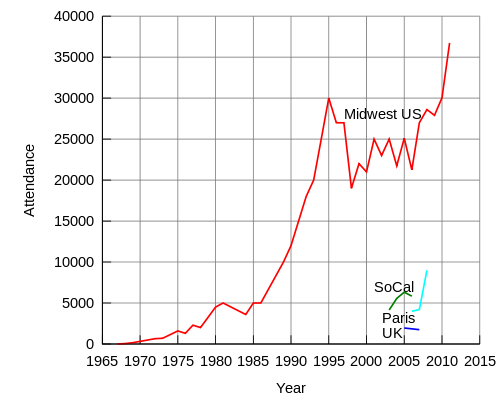With the recent purchase of an e-reader, I’ve found myself reading through the early Dragon Magazines as my pre-bed reading. I’m up to about issue 30, so still in the late 70’s right around the publication of AD&D. What I find is that I’m tending to skim through the articles about game mechanics while really reading carefully anything that mentions gamer culture of this time period. My conclusion: wow, the convention scene of the late 70’s really was the life-blood of this hobby.
There is not a single issue I have read yet that does not include at least one, and often multiple articles about conventions. And I’m not just talking here about a little blurb about what conventions are coming up, though those do exist. Pages are devoted to describing how to run tournaments, play reports of past tournaments, descriptions of organization issues of conventions (looks like Origins ’79 almost didn’t happen), photos from conventions, etc. Some have argued that a lot of what’s in AD&D was specifically a reaction to the tournament scene at these conventions, which I can definitely see. That said, it’s not like the folks at TSR had some kind of inflated sense of what the point of the conventions were from the business side. In issue #28, Gygax writes about his take on the manufacturer’s view of conventions. Here’s a little blurb:
The goodwill generated from “showing the flag” is considerable. Still, considering that there are probably half a million game hobbyists, and perhaps no more than about 10,000 different gamers attending the major conventions, half of whom will be the biggest show, the overall portion of the market reached by exhibiting is 1% to 2% or so. Even if this “hard core” represents a disproportionate share of the market in dollar volume of their purchases, 2½% to 5% is not earthshaking. Yet, whenever TSR attends a convention, we must assume that the advertising and goodwill generated there will be considerable, and be prepared to write off a considerable sum as expense incurred advertising.
He goes on to do the math of the cost for a manufacturer to attend a convention, which sounds humorous to modern ears if you fail to account for inflation. His point though is clearly to show that the cost out-weights the benefit in the perspective of raw sales. Why do they attend? Gygax attributes it mostly to the “good-will” factor mentioned above, plus the fact that ultimately the manufacturers are themselves gamers, and just love going.
In fact, GenCon pre-dates the creation of D&D by several years — the first GenCon was a little gathering in Gygax’s basement in 1967 (called GenCon 0), and D&D doesn’t hit the printing presses until 1974. You might even say D&D may have never existed without GenCon, as according to this wikipedia article Gygax and Arneson first met at GenCon II.
In the early days, I’m sure the conventions were a major factor in the distribution of ideas and interest in this hobby. Now with the internet that aspect may be lessened, but it does not change that the hobby is essentially a social one requiring that we all gather together at a common location. Sure, some people, myself included, have had some success at playing over the internet, but I don’t think we’re at a point yet where it’s really a viable replacement. And so the draw of the gaming convention remains high, in fact disproportionately to the growth of the industry. Unfortunately I can’t find any good numbers or graphs showing the rise and decline of the gaming industry for comparison, but general wisdom is that the industry ‘aint what it used to be. That said, check out this lovely attendance graph of GenCon over the years:
 Sure, there was a lull starting around 1995, but it looks like since about 2006 we’ve been trending upwards again. What’s my point here? I guess ultimately I think conventions not only started out but continue to be the lifeblood of this hobby. If nothing else, it forces a group of normally introverted folks to go out and mingle with other hobbyists, gets them bouncing ideas off each other, and keeps the whole thing vibrant. Even if you yourself don’t go to conventions, I bet you game with someone that does, or read the blogs of someone who does (you’re doing that right now). The internet is great at disseminating ideas, but the convention is where they are formed.
Sure, there was a lull starting around 1995, but it looks like since about 2006 we’ve been trending upwards again. What’s my point here? I guess ultimately I think conventions not only started out but continue to be the lifeblood of this hobby. If nothing else, it forces a group of normally introverted folks to go out and mingle with other hobbyists, gets them bouncing ideas off each other, and keeps the whole thing vibrant. Even if you yourself don’t go to conventions, I bet you game with someone that does, or read the blogs of someone who does (you’re doing that right now). The internet is great at disseminating ideas, but the convention is where they are formed.
I sincerely hope that continues, even if the big companies change their faces or go away entirely. I see folks like Kask and Mentzer trekking around to conventions these days and think yeah, that’s pretty much how I’d like to spend my retirement. I hope it’s still there as an option when I’m ready for it.



After finally getting to Origins last year… I have to say it was amazing. There were game designers everywhere. People were play-testing next year’s releases. The top gamers for Federation & Empire met to chart the course of the game. And any game that you don’t see played in your Friendly Local Game Store, there is somebody, somewhere running it. People that want to play rpgs, but that come from places where their local group has been torn apart by personality conflicts… they come ready to game… sometimes all through the night. Games you can’t play anywhere else due to lack of players… they just happen. And it’s not like playing with noobs, either– every single person at your table would be an “alpha gamer” anywhere else. It’s just awesome.
This is a great, great, post. Just fantastic. And that’s an awesome quote from Gygax, showing an extremely high awareness of the relative status of conventions.
Interesting follow up: as I’ve started reading through Dragon magazine issues past #30, suddenly all the convention talk is gone (this is around 1980). Is it possible that the article in issue #28 was Gary’s wake-up call to himself and his company? Or is this just reflective of the growth of TSR, as the employees’ perceptions of themselves shift from “fellow gamer” to “professional game designer”?
^ Interesting!